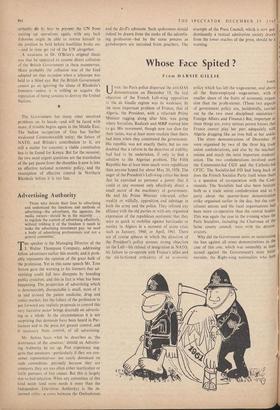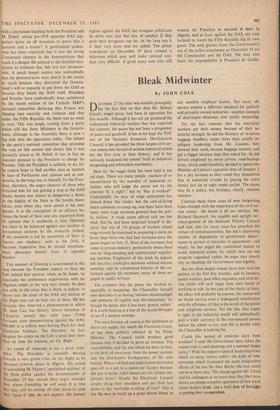Whose Face Spited ?
From DARSIE GILLIE PAR iq UNM- the Paris police dispersed the anti-OAS demonstration on December 19, the real objection of the French Left-wing opposition to the de Gaulle regime was its weakness. In the most important problem of France, that of Algeria, the President, with a reluctant Prime Minister tagging along after him, was going where Socialists, Radicals and M RP wanted him to go. His movement, though now too slow for their tastes, was at least more resolute than theirs had been when they constituted the government. His republic was not exactly theirs, but no one doubted that a reform in the direction of stability had had to be undertaken, if only to find a solution to the Algerian problem. The Fifth Republic has at least been much more republican than anyone hoped for about May 20„1958. The anger of the President's Left-wing critics has been that he exercised so personal a power that it could at any moment only effectively direct a small sector of the machinery of government. He and his Prime Minister tolerated, either weakly or wilfully, Opposition and sabotage in both the army and the police. They refused any alliance with the old parties or with any organised expression of the republican sentiment that they were so quick to mobilise against barricades or mutiny in Algiers in a moment of acute crisis such as January, 1960, or April, 1961. There are of course spheres in which the direction of the President's policy arouses strong objection on the Left—his refusal of integration in NATO, his failure to co-operate with France's allies and the old-fashioned orthodoxy of an economic policy which has left the wage-earner, and above all the State-employed wage-earner, with a smaller share of the fruits of economic expan- sion than the profit-earner. (These two aspects of government policy are, incidentally, carried out by the two most disciplined ministries— Foreign Affairs and Finance.) But, important as these things are, every serious person knows that France cannot play her part adequately with Algeria dragging like an iron ball at her ankle.
The street demonstrations of December 19 were organised by two of the three big trade union confederations, and also by the teachers' unions and much the most important students' union. The two confederations involved were the Communist-led CGT and the Catholic-led CFTC. The Socialist-led FO had hung back as does the French Socialist Party itself when there is a question of co-operation with the Com- munists. The Socialists had also been hesitant both as a trade union confederation and as a party about the quarter-hour demonstration strike organised earlier in the day, but the con- stituent unions and the local organisations had been more co-operative' than the central bodies. This was again the case in the evening when the Paris Socialists, including the Chairman of the Seine county council, were with the demon- strators.
Why did the Government insist on maintaining the ban against all street demonstrations in the case of this one, which was ostensibly at least turned against the Government's most bitter enemies, the Right-wing nationalists who hate with a passionate loathing both the President and M. Debit, whose pre-1958 speeches OAS sup- porters quote on all occasions to prove him a turncoat and a traitor? A government spokes- man has since explained that it was the strong Communist element in the demonstration that made it a danger. He pointed to the Socialist hesi- tations as evidence that this was not unreason- able. A much deeper motive was undoubtedly that the demonstrators were clearly in the streets as much because they distrusted the Govern- ment's will or capacity to put down the OAS as because they hated the OAS itself. President and Premier have undoubtedly been embittered by the recent motion of the Catholic MRP's -national committee declaring that France was slipping into anarchy and violence and that under the Fifth Republic the State was as weak as ever. This was tough, coming from a party which still has three Ministers in the Govern- ment, although in the Assembly there is now a big leak into the opposition lobby. The debate in the party's national committee that preceded the vote on this motion had shown that it was primarily aimed at M. Debit. It was in fact an insistent demand to the President to change his Premier. This the President is unlikely to do, for he cannot hope to find another man as staunch in face of Parliament and opinion and as sub- missive, in the long run, to himself. To the Presi- dent, therefore, the angry clamour of those who criticised him for not putting a stop to the OAS plastic bombs was almost as dangerous a threat to the dignity of the State as the bombs them- selves, even when they were aimed at his own person. It is the conception of an alliance be- tween the head of State and any organised body 01 opinion that is anathema to him. Opinions are there to be balanced against one another in harmonious patterns by the monarch. Indeed, if the monarch is led by necessities of State to repress one tendency, such as the OAS, it becomes imperative that he should simultane- ously dissociate himself from its opposite number.
This manner of thinking is accentuated in this case because the President expects to have the Left behind him anyway when, as he hopes, he concludes the preliminary negotiations with the Algerian rebels in the very near future; he does not wish, in the crisis that is likely to follow, to throw into the arms of the OAS any section of the Right that can be kept out of them. He has certainly also observed a phenomenon to which M. Jean Cau has bitterly drawn attention in L'Express, namely that while some 25,000 Parisians were demonstrating against the OAS, 900.000 or a million were leaving Paris for their Christmas holidays. The President. in fact, despises his critics on the Left a good deal more than he does his enemies on the Right.
An excess of contempt is not a good coun- sellor. The President is certainly moving towards a very grave crisis on the Right as'he advances towards peace in Algeria. His action in unleashing M. Papon's 'specialised sections' of the Paris police against the demonstrators of December 19 has caused deep anger amongst then whose friendship he will need. It is true that they will be cutting off their noses to spite their faces if they do not support the present regime against the OAS, but arrogant politicians do drive men into that line of conduct if they push their arrogance too far. In the long run it is their own faces that are spited. The police truncheons on December 19 have created a bitterness which may well make rational con- duct very difficult. A good many men who still wanted the President to succeed at least in Algeria, and at least against the OAS, are now inclined to watch the Fifth Republic dig its own grave. The only gainers from the Government's use of the police truncheons on December 19 are the Communists and the OAS. The man who bears the responsibility is President de Gaulle.



























 Previous page
Previous page